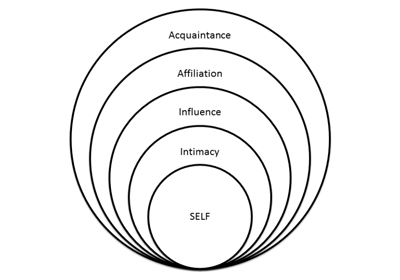Neil Crofts, on his blog yesterday, posted a really interesting slant on understanding the psychology of the UK elections. Here’s what he has to say:
Political parties in the UK are divided along levels of consciousness lines. The differences between them are to do with development, awareness and circles of care and blame. This description starts with the smallest circle of care and the widest circle of blame.
It is worth recognising that as in Spiral Dynamics people are only really capable of understanding the levels that came before them (i.e. smaller circles of care) and are not capable of understanding the levels after. It is very hard for a UKIP circle person to comprehend the Liberal Democrat or Green point of view at all. They are likely to see them as entirely abstract.
Equally while later levels (larger circles of care) can understand the prior levels intellectually they are liable to dismiss them as being ill considered.
UKIP – for UKIP the circle of care is the individual and to some extent their tribe. The circle of blame is everyone outside of that circle. Their premise is that the tribe members suffering is caused by those outside the tribe – namely immigrants and Europe. And that if those elements were to go away, life within the tribe would be better. This is a very old perspective that can still be observed in chimpanzee colonies. It is a fundamentally psychologically flawed argument in that it is impossible to change anything for the better until we are willing to take some responsibility for the situation we are in.
Conservatives – for the Conservatives the circle of care is still the individual and the family (or business) but the circle of blame is smaller. The Conservatives tend to blame those who don’t conform to their world view and might name them as “lazy people” or similar. For the more right wing elements this also includes Europe and immigrants. The Conservatives view is that if those elements would only work harder and convert to the “right” way of thinking then everything would be better.
Labour (SNP and Plaid Cymru) – For Labour the circle of care is the community and the circle of blame is forces, not necessarily people, that harm the community. There is an inherent desire to link up with other similar communities and to collaborate against the common enemies. Historically these would have been big business, but this increasingly includes the rich. Labour’s explicit pitch is inherently vague in order to avoid excluding people who might vote for them.
Liberal Democrat – For Liberal Democrats the circle of care is society as a whole and with a significant future component – perhaps the next 50 years. There is no blame as such, only problems that need to be solved and thinking that needs to be developed. Liberal Democrats believe in collaborating with everyone to solve the problems – including those who disagree with them. Their unwillingness to blame others makes Liberal Democrats very hard for those with high blame cultures to understand.
Green – For Greens the circle of care is global and includes all life and over a significant duration, 200 to 300 years. Like the Liberal Democrats, Greens are not keen to blame and believe that of increasing awareness of the problem will naturally lead people to the same conclusions they have come to. The Green approach is seen to be leftist in traditional terminology and while there are some similarities the core purpose is entirely different. Like the Liberal Democrats the Greens are inherently collaborative and want to build broad coalitions to solve problems. Their weakness is that while they are very good at focussing on the problems, they are less strong at identifying and providing the solutions.
Threat is change you are not leading.
